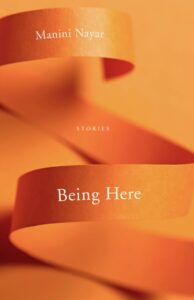Manini Samarth publishes new short-fiction collection

 Manini Samarth, Associate Teaching Professor of English and Women’s, Gender, and Sexuality Studies, has published Being Here out of the University Press of Kentucky. Samarth’s collection was chosen in 2020 as the prose entry to be published in the press’s New Poetry & Prose Series, which every year “seeks manuscripts of contemporary poetry and fiction that exhibit a profound attention to language, strong imagination, formal inventiveness, and awareness of one’s literary roots.” Being Here features eleven stories focusing on immigrant women’s experiences “making their way in the world as mothers, as wives, as outliers, and as rebels.” Reviewing the volume in the New York Times, Samantha Hunt observes that it “ends up reading like a generational novel, with twisting strands of DNA” revolving around the recurring character Nina, whose story of “Broken hearts must be told in broken ways.” And yet, as Hunt writes, it is through this fragmentation that the collection “reveals the invisible details that unite us.” Congratulations, Manini!
Manini Samarth, Associate Teaching Professor of English and Women’s, Gender, and Sexuality Studies, has published Being Here out of the University Press of Kentucky. Samarth’s collection was chosen in 2020 as the prose entry to be published in the press’s New Poetry & Prose Series, which every year “seeks manuscripts of contemporary poetry and fiction that exhibit a profound attention to language, strong imagination, formal inventiveness, and awareness of one’s literary roots.” Being Here features eleven stories focusing on immigrant women’s experiences “making their way in the world as mothers, as wives, as outliers, and as rebels.” Reviewing the volume in the New York Times, Samantha Hunt observes that it “ends up reading like a generational novel, with twisting strands of DNA” revolving around the recurring character Nina, whose story of “Broken hearts must be told in broken ways.” And yet, as Hunt writes, it is through this fragmentation that the collection “reveals the invisible details that unite us.” Congratulations, Manini!

 Manini Samarth, Associate Teaching Professor of English and Women’s, Gender, and Sexuality Studies, has published Being Here out of the University Press of Kentucky. Samarth’s collection was chosen in 2020 as the prose entry to be published in the press’s New Poetry & Prose Series, which every year “seeks manuscripts of contemporary poetry and fiction that exhibit a profound attention to language, strong imagination, formal inventiveness, and awareness of one’s literary roots.” Being Here features eleven stories focusing on immigrant women’s experiences “making their way in the world as mothers, as wives, as outliers, and as rebels.” Reviewing the volume in the New York Times, Samantha Hunt observes that it “ends up reading like a generational novel, with twisting strands of DNA” revolving around the recurring character Nina, whose story of “Broken hearts must be told in broken ways.” And yet, as Hunt writes, it is through this fragmentation that the collection “reveals the invisible details that unite us.” Congratulations, Manini!
Manini Samarth, Associate Teaching Professor of English and Women’s, Gender, and Sexuality Studies, has published Being Here out of the University Press of Kentucky. Samarth’s collection was chosen in 2020 as the prose entry to be published in the press’s New Poetry & Prose Series, which every year “seeks manuscripts of contemporary poetry and fiction that exhibit a profound attention to language, strong imagination, formal inventiveness, and awareness of one’s literary roots.” Being Here features eleven stories focusing on immigrant women’s experiences “making their way in the world as mothers, as wives, as outliers, and as rebels.” Reviewing the volume in the New York Times, Samantha Hunt observes that it “ends up reading like a generational novel, with twisting strands of DNA” revolving around the recurring character Nina, whose story of “Broken hearts must be told in broken ways.” And yet, as Hunt writes, it is through this fragmentation that the collection “reveals the invisible details that unite us.” Congratulations, Manini!